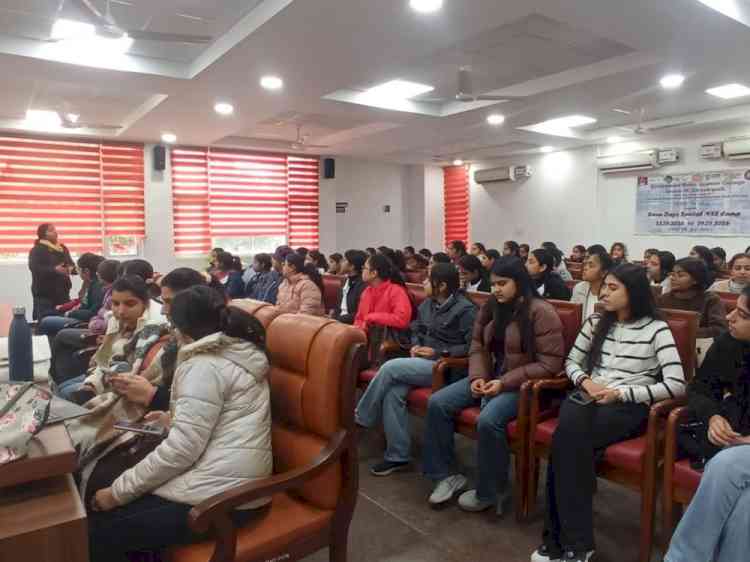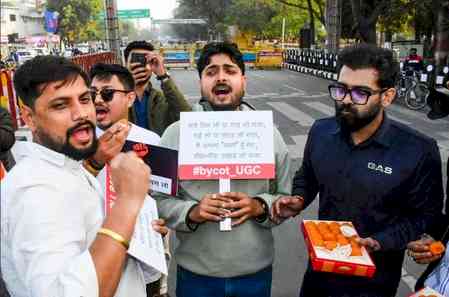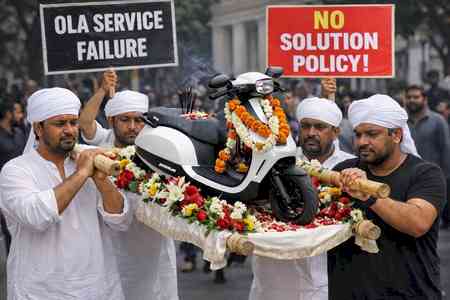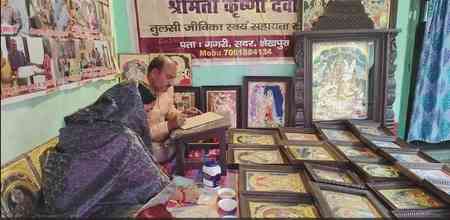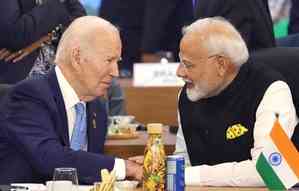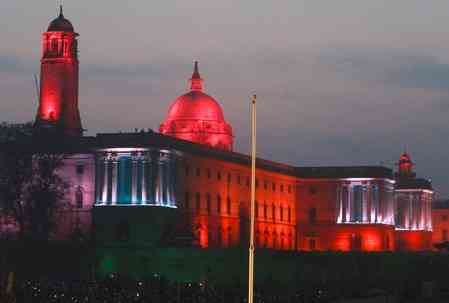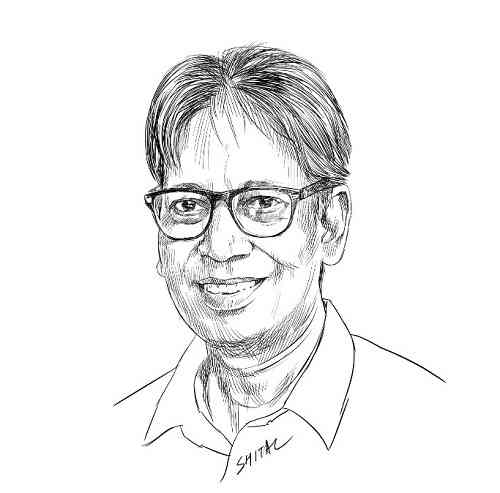Workshop on Crop Residue Burning: Science for Solution and Society
Department of Environment Studies along with Technology Enabling Center, Panjab University, Chandigarh, in collaboration with the Department of Community Medicine & School of Public Health, PGIMER, Chandigarh, along with Climate Trend, New Delhi, organized a 1-day workshop on Crop Residue Burning: Science for Solution and Society on October 3.
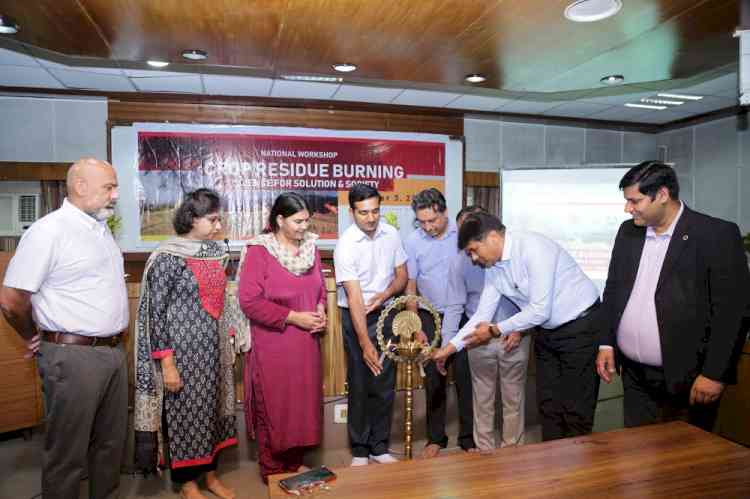
Chandigarh, October 4, 2022: Department of Environment Studies along with Technology Enabling Center, Panjab University, Chandigarh, in collaboration with the Department of Community Medicine & School of Public Health, PGIMER, Chandigarh, along with Climate Trend, New Delhi, organized a 1-day workshop on Crop Residue Burning: Science for Solution and Society on October 3.
The workshop included representatives from respective pollution control boards, experts, practitioners and farmers who came together to discuss the ground solutions. The organizing team included Dr. Suman Mor, Prof. Manu Sharma from Panjab University, and Ms. Aarti Khosla and Professor Ravindra Khaiwal. Dr Khaiwal said, “Air pollution is a major human health risk. We cannot delay the action while waiting for the local evidence. Hence, there is a need to promote inter-sectoral coordination to act effectively on pollution control measures.” Dr Mor mentioned that they are engaging farmer communities for sustainable solutions through various awareness campaigns and developing information material in regional languages to reach out commoner.
The inaugural session was chaired by Dr. Sudesh Kumar Yadav, Scienist G, Center of Innovative and Applied Bioprocessing, India and Professor Yajvender Pal Verma, registrar, Panjab University, Chandigarh. Dr. Sudesh Kumar Yadav highlighted that the supply chain needs to be adequately established to manage the crop resides. Professor Verma mentioned that Panjab University is ready to provide a platform for any innovation to support research and development for any entrepreneur utilizing crop residues sustainably.
The conference started with a session, ‘Handling the Air Pollution Boundaries, moderated by Shri S. Narayana, IFS, Haryana, and he highlighted that air pollution has no boundaries and hence we need to work collectively. He emphasized a need for proper urban planning focusing on green infrastructure. Mr. Arulrajan P, IFS and Member Secretary, Chandigarh Pollution Control Committee, Chandigarh, mentioned that working on local environmental issues will also help to achieve the SDG goal by 2030. Mr. Gurnam Singh, Regional Director, Central Pollution Control Board, New Delhi, mentioned that they work with all states suffering from episodic high air pollution during winter and also developed the graded response action plan to address the peak pollution levels.
Mr. Karunesh Garg, Member Secretary, Punjab Pollution Control Board, Punjab, said that Crop diversification is not the long-term solution because it does not mean other crops will not produce the biomass. It will just be another kind of biomass waste, like cotton sticks, mustard straw waste coming from Rajasthan to Punjab. The issue with respect to the burning of this fuel will always remain. So we need to find solutions, both in situ and ex-situ. A combination of these can only be effective.” Mr Garg further added, “It's not that the problem is not being addressed, we are mapping it down to the block and village level, but it will take 4-5 years for proper problem resolution.” Explaining that counting the number of farm fires is an inaccurate measure of understanding stubble burning, the Punjab Pollution Control Board said that the acreage of land being put on the fire is the parameter to be measured. During the Kharif season 2022, paddy has been grown in approximately 31.13 lakh hectares, an increase from 29.61 lakh hectares in 2021, resulting in 19.76 million ton paddy straw generation this year, vs. 18.74 last year.
Dr Adarsh Pal Vig, Chairman, Punjab Pollution Control Board, Punjab “There was a time when it was recommended to burn biomass waste. The problem has increased as we have mechanized more in the last few decades. The solutions will eventually have to be adopted by farmers because it is a social and psychological problem where the behavior and attitude of farmers also need to be addressed. We must highlight the stories of those farmers who have succeeded in not burning stubble and make sure they interface with other farmers and encourage and motivate them. He further added, "Ambient air pollution is normally considered a problem only in cities even though the burning is being done in villages. The National Clean Air Programme and the Air Quality Index are all focussed on cities. Urbanization and the population density in cities are beyond carrying capacity and causing a problem. Due to other contributing factors, big cities like Delhi are already sitting on a tipping point and stubble becomes that straw every season.”
The industrial partners included Mr. Harmeet Singh, Farmer & Founder, Dairy Farmer Association, Mr. HS Cheema, Cheema Boilers Limited and Mr. Ashish Kumar, Verbio India Pvt Limited. They shared their success stories of how they are utilizing the crop to generate bioenergy. Mr. Kumar highlighted our business model of converting biomass waste into fuel that can be used for automotive or commercial purposes. However, it survives on 3 revenue streams – manure, gas, and carbon credits. Right now, we can only generate revenue for gas, but the other two are not set up in India and till then, these businesses will not be very viable.” Dr. Poonam Khanna, Associates Professor, PGIMER, highlighted the need for crop diversification and adopt millets in daily life to generate demand. The event had farmers from Haryana and Punjab who shared that how through utilizing crop residue, they are having increased yield and lesser use of pesticides and fertilizers.
During the session Challenges & Opportunities for the Upcoming Stubble Burning Season, Dr. Nataraja Subash, Principal Scientist, Indian Councial of Agricultre Research, Meerut, said, "We must focus on integrated farming which includes about 3 to 4 crops and livestock. We have 64 prototype models currently being tried out with a few farmers and the successful models have been sent to the government. We are advocating this throughout the entire country. We are researching farming patterns over a 10-year period, enabling us to decide the best cropping systems for the country in changing climate.” Dr. BK Padhi, Assistant Professor, PGIMER, Chandigarh, mentioned that we need to focus on proper data monitoring and management. Mr. Kurinji Selvaraj, Research Analyst, Council for Energy Environment & Water, said that policy and ground-level reality should match to yield the proper results. Dr. MS Bhatti, Professor, Guru Nanak Dev University, Amritsar, mentioned that we need to better underatddn the meteorological parameter better to understand the pollution buildup, including the cleanup mechanism. Dr S K Sahoo, Punjab Remote Sensing Centre, Patiala, mentioned that they are working with other stated to have stargard protocoaal to measure fire count and are working to refine the methodology to measure them accurately. Dr PVM Lakshmi, Professor, PGIMER, Chandigarh, stated that air pollution causes numerous health issues and we need to focus on long-term epidemiological studies for better estimation.


 City Air News
City Air News 

